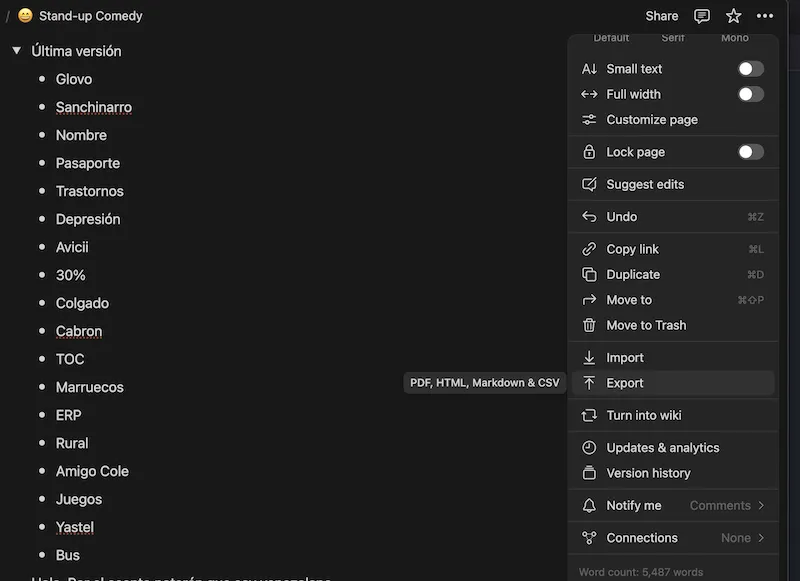2024: Personal Snapshot
This is my annual review. I use it as a way to reflect on the past year and get a snapshot of “who I am” at the time of writing.
If it’s me rereading this, welcome back. This is Dylan from 2024.
In previous snapshots, I listed what went well and what didn’t. This year, I’m trying something new: a chronological approach. 2024 went through three distinct phases, and I found it easier to reflect on each one.
Early 2024
This was my “I’m lost, and I don’t know what to do” phase.
In my last snapshot, I said that I was going to focus on building a consulting practice in 2024. Then I came up with a new product idea 😅 and spent a big chunk of the first two months of the year building a prototype.
AItheneum1 is a tool that helps you read classic philosophy books by making them easier to understand using AI. I pitched it as a way to make classic books more accessible to modern readers.
I had fun working on it, but it wasn’t really solving anyone’s problem. It was a vitamin, not a painkiller. By the time I released it, it was clear nobody cared about it (not even me!).
During this time, I was also contributing to django-components and half-assing talking to potential clients for freelance work and doing cold outreach to get clients. The former was fun, the latter wasn’t.
Later in the year, after reading Alex Hormozi’s 100M Leads, I realized that cold outreach at this stage was mostly a waste of time. When you’re just starting out, you should rely on warm introductions or referrals. If you haven’t built credibility yet, you’ll waste a lot of time trying to convince strangers to work with you.
I essentially spent the first two months of the year focusing on the wrong things.
On a more positive note, I was also doing open mic sets almost every week. I’m not sure if this was “good”, but I had a lot of fun performing stand-up comedy.
As you might expect, I bombed a few times. But I also had a few good sets. A professional (but not famous) comedian even invited me to open for him at a show in a nearby city. I didn’t go, but it was flattering.
One thing that surprised me about stand-up comedy is that it follows a somewhat scientific process. Your joke is a hypothesis about what your audience will find funny. You test it by performing it in front of people. If it doesn’t work, you adjust it and test it again. You do this over and over until you find something that works.
The other thing I liked about it is that it’s very meritocratic. If you’re funny, you’ll get laughs. There’s no way to fake it. It’s very easy to figure out who’s good and who’s not. You might not like someone’s style, but if they’re good you cannot deny it.
However, after a few months, I realized it wasn’t sustainable:
- To get good at stand-up, you have to make time for it. That means writing everyday, and performing as often as possible.
- Open mics take a lot of time. To practice an 8 minute set, I’d often have to commute for 1 hour and stay for 1-2 hours of show (during which I did my 8 minutes).
- As a beginner, you’ll only get spots during weekday evenings. Which isn’t great if you want to get enough sleep to be productive the next day.
Even so, I didn’t fully decide to quit until we had a health crisis at home. My wife and I weren’t prioritizing our health in the first months of the year, and it took its toll.
Stand-up was fun, but it was distracting me from more important things. So I stopped.
I’m not sad or regretful about it, I’m happy that I’ve tried it and that I’ve learned that it’s not what I want to do right now. I’d love to return to it in the future, once I have less pressing things to focus on.
Mid 2024
This was the “work hard and mental health struggles” phase.
I worked with clients on AI projects in various industries, including legal, construction, consumer packaged goods, and finance. I also started blogging again.
I frequently put in 12-hour workdays and worked most weekends. I stopped going to the gym, and switched to home workouts. I rarely went to social events. Life passed by rapidly, and looking back, it all feels like a blur.
I struggled with my mental health. I experienced episodes of depression and anxiety.
Depression has been part of my life for the past twenty years. Though, I’m much better at dealing with it than I used to be. I’ve learned to recognize early warning signs and adjust my approach accordingly.
For that reason, I try to keep track of the “bad days”. Because when they occur too often, my brain is telling me I should take action. During this phase of the year, I had a lot more of those than I’d like.
Eventually, things settled down. I became more conscious of my own limits. I learned to regulate the intensity I put into things. I could push myself hard when I needed to, but also learned to feel comfortable with taking a break and not do anything when I needed to.
I also met some clients in person. While I’m a fan of remote work, seeing people face to face makes you more empathetic toward the people you’re working with. This was a lot more fun than I expected.
During this time I also hired external support to help me develop some of my product ideas and support my consulting work.
Late 2024
This was the “force myself to stay focused and in motion” phase.
The last few months were still intense, but less focused. I was working with clients while also making time to think about the future. I had a few moments of “what if I drop the consulting thing and go back to product development?”, but decided against it every time.
I did more sales outreach, managed multiple projects, and kept writing blog posts. I wrote a post about using Structured Outputs in LLMs and fixed a security vulnerability in a Python package that gets more than 1M downloads per month.
I also traveled to Venezuela for the first time in eight years. It was both wonderful and unsettling.
During the first week of the trip, we stayed in a nice hotel in Margarita, with great food, gym, pools, and a private beach. But if you talked with anyone working at the hotel, you’d learn they were making less than $200/month and did not routinely have access to clean water or electricity. After almost a decade of living in Europe, it felt strange to witness once again such a disparity.
I also met old friends and family there. It made me nostalgic for my childhood and university days, but it also made me realize how much I’ve changed since then. When I was a teenager, I often thought I might end up alone and without friends, as I had extreme social anxiety. Now I’m married, have a great group of friends, and can even tell jokes in public!
After I came back from Venezuela, I started going through more academic research and refreshing my math skills. I’ve always felt that some of my base math skills were lacking and I wanted to fix that. So far, it’s going great.
My father-in-law also moved with us for this part of the year. It was a big change for us, but it’s been a great experience.
Stats & Photos
Here are the stats for the year:
- 💻 Code and blogging:
- I committed code on 322 out of 365 days.
- I wrote 14 blog posts.
- 💰 Financials:
- Revenue doubled from last year. So far, my best year.
- Costs increased by 155% from last year.
- 66% of my revenue comes from time-based billing (daily, hourly).
- My biggest client represented 33% of my revenue.
- 📝 Sales:
- I worked on 9 projects with 7 different clients.
- I got 3 new clients.
- Success rate of proposals: 67%.
- 💪 Health & Fitness:
- 112 strength training sessions (2.2 sessions/week).
- 3,488 minutes of cardio (~60 minutes/week).
- VO2 max: 46 ml/kg/min.
- RHR: 57 bpm.
These are some photos from the year:
I don’t like taking pictures, but looking back, I regret not capturing more key moments from the year. That’s a small lesson I’ll take into next year.
Lessons Learned
The three biggest lessons I took away from 2024 are focus, intensity, and action.
Focus is about figuring out what are the right things to prioritize. It’s easy to say that, but it’s hard to do. Life is full of distractions, and it’s easy to get lost in the noise.
When I’m not sure what to do, I use one heuristic that works well: I prioritize things that will help me on my way regardless of their outcome. For example, if I dedicate more time to writing technical posts, I learn through the act of writing, but I also attract clients who are interested in those posts. The same with sales: I might not get a client from a sales call, but I learn a lot about the process and get better at it. So, regardless of the outcome, I win.
Intensity is about working hard and taking ownership. This year I handled more work than ever. My brain fought back. At times I felt anxious, depressed, out of energy, and unable to focus. Eventually, my brain accepted that I wouldn’t back down. It stopped fighting against me and began working for me.
It’s not pretty. It’s deeply uncomfortable. But it’s worth it.
Action is about staying in motion. Being too busy is better than being too idle. When you’re busy, you’re constantly learning, forced to prioritize, and often become more creative under pressure.
I used to think that being “too busy” would prevent me from focusing on the right things. But I eventually realized it was the other way around. The busier I got, the clearer my priorities became. I learned more, and the better I became at what I was doing, the more time I had for the things I really wanted to do.
Being busy made me better and more productive.
What’s Next?
I’ve realized I’m not great at predicting what I’ll want to do, nor am I a great planner.
Right now, my biggest priority is growing my consulting practice. I also finally found a painkiller product idea that I’ve been slowly working on. If I find enough traction, I’ll pivot to it. But until then, my focus is on consulting.
The only thing I’m sure is that I’ll keep myself busy.
Footnotes
yes, I know, what a terrible name.↩︎
Citation
@online{castillo2025,
author = {Castillo, Dylan},
title = {2024: {Personal} {Snapshot}},
date = {2025-01-05},
url = {https://dylancastillo.co/posts/2024-personal-snapshot.html},
langid = {en}
}

